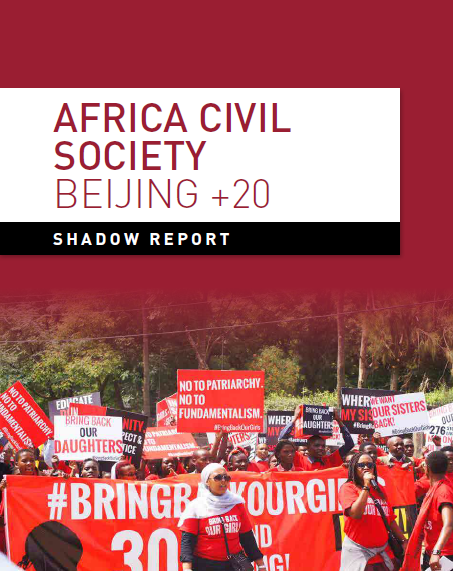
Africa Civil Society Shadow Report on Beijing+20
2015 marks the 20th anniversary of the agreement signed by 189 countries that attended the Fourth World Conference on Women in Beijing, China.
Over the last two decades, Africa has made significant strides in developing progressive frameworks to advance the rights of women. These strides have been evident in the adoption of the gender equality principle in the African Union’s (AU) Constitutive Act of 2002, the AU Protocol to the African Charter on Human and Peoples’ Rights on the Rights of Women in Africa of 2003, and the Solemn Declaration on Gender Equality in Africa of 2004, to mention a few. At a national level and as is demonstrated in the state reports, there has been significant progress in critical areas such as: girls’ education, women’s political participation, maternal health, adoption of action plans on UN Security Council Resolution 1325, as well as laws and policies on violence against women, amongst others. In this regard, African states must be commended for continued efforts to sustain initiatives towards gender equality generally and women’s rights specifically.
As this report demonstrates, there is much more that can be done, not only by governments accelerating the allocation of adequate financial and human resources towards implementation of BPFA and other regional instruments, but also in responding to contemporary internal and external threats that hinder the transformation of the structural inequality. This report addresses gaps in reporting based on contemporary and renewed threats as well as areas where additional and persistent efforts are still required and offers a series of recommendations.
The report is structured around four main sections: the first section offers an overview of the evolution of the socio-economic and political terrain within which women’s rights work has occurred. The second substantive sections summarizes the key findings from the 51 state reports and the trends noted across all 51 state reports that were submitted to the United Nations Economic Commission for Africa (UNECA). The third substantive section looks at the 12 critical areas, assessing gaps in state reporting and highlighting illustrative examples where innovation and/or where progress has occurred in specific states. These illustrations are not designed to highlight what all 51 reporting states have done in the 12 areas. The final section concludes with a set of recommendations.
Click here to download/ read the Africa_Civil_Society_Beijing +20_Shadow_Report






